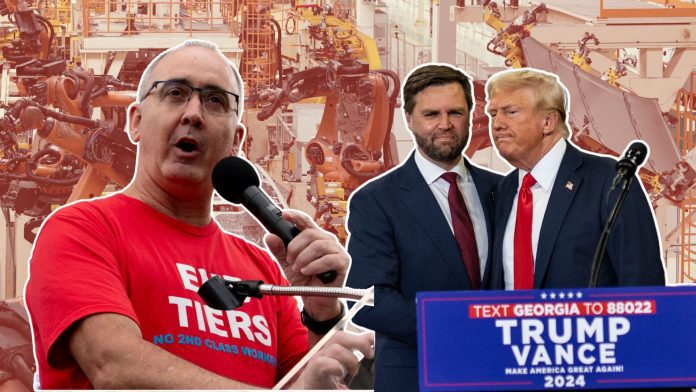On Thursday, UAW President Shawn Fain warned that hundreds of thousands of U.S. jobs would be at risk if former President Donald Trump won the November 5 election and followed through on plans to repeal electric vehicle (EV) investments. Fain emphasized that these potential job losses go beyond a single facility, threatening auto factories and supply chains nationwide.
At the center of the issue is U.S. Senator JD Vance, Trump’s running mate. The UAW has criticized Vance for his noncommittal stance on maintaining a $500 million investment to convert a Cadillac plant in Lansing, Michigan, into an EV facility. Fain highlighted that removing the funds would jeopardize 650 jobs in Lansing and have broader repercussions throughout the U.S. auto industry.
“This isn’t just about Lansing; it’s about factories and supply chains nationwide,” Fain told reporters, criticizing Trump’s indifference to the potential job losses. His comments came ahead of Trump’s planned visit to Detroit, a city deeply tied to the auto industry.
Vance defended his position, downplaying the $500 million investment as “table scraps” compared to the perceived threat EV mandates pose to traditional autoworker jobs. He claimed the Biden administration’s push for electric vehicles could lead to the loss of 117,000 autoworker positions. However, Vice President Kamala Harris, whom Fain and the UAW have endorsed, rejected the notion of an all-EV mandate, stressing consumer choice and competitiveness with China.
Fain reiterated that UAW’s internal polling strongly supported Democratic candidates among its members, contrary to Trump’s belief that autoworkers favor him. He pointed out that the Biden administration has imposed a 100% tariff on Chinese EVs to create more opportunities for U.S. automakers.
Trump has previously indicated that he would consider repealing the $7,500 EV tax credit established under President Biden’s Inflation Reduction Act, a move that could further disrupt the industry’s transition to electric vehicles. While president, Trump attempted to eliminate the EV tax credit, which was later expanded by Biden in 2022.
Fain’s remarks reflect growing tensions between the UAW and Trump’s campaign, with autoworkers concerned about the future of EV production and job security under a potential Trump presidency.



